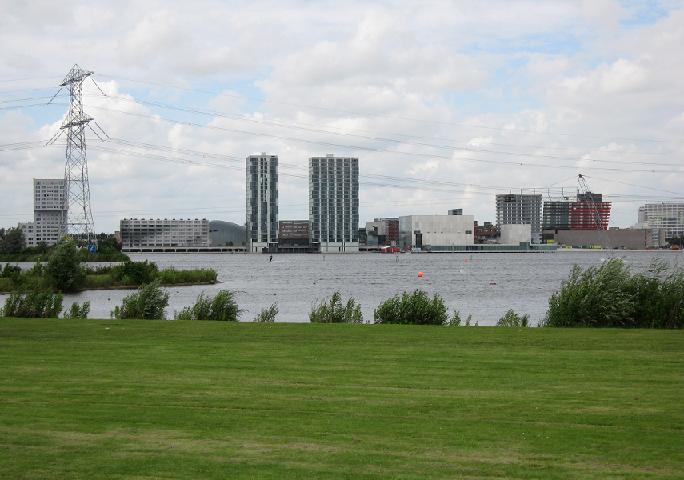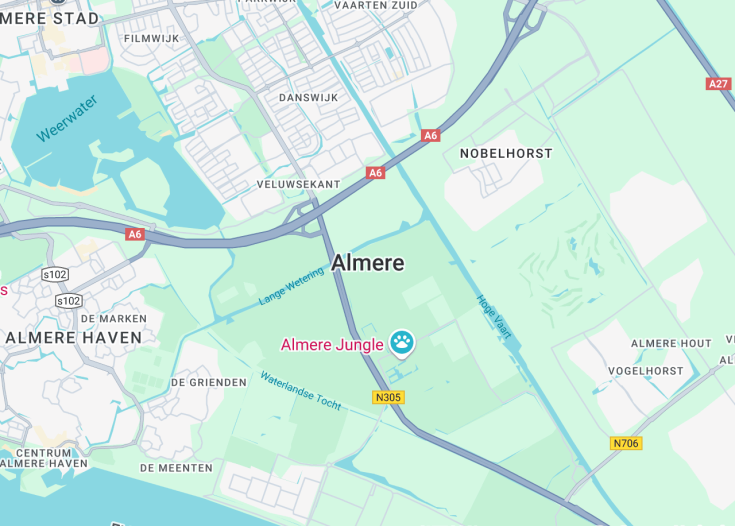Almere, a contemporary gem in the Netherlands, exemplifies modern urban planning and architectural innovation. Founded in 1976 on reclaimed land, this vibrant city is not only the newest within the country but also boasts a significant emphasis on sustainability and green living. With its manifold parks, lakes, and an extensive network of cycling paths, Almere offers a fresh perspective on city life intertwined with nature. It’s an exemplary destination for those intrigued by pioneering town-planning and ecological lifestyles, all while maintaining proximity to the historical allure of Amsterdam.
When visiting Almere, make sure to explore its extensive network of cycling paths; it’s a splendid way to truly connect with the city’s innovative spirit and green philosophy.
Consider taking a guided architecture tour to grasp the full extent of Almere’s modern urban developments and the visionary planning that shapes its landscape.
Top things to do & see in Almere
Select the following sights and activities to discover best tickets and tours available in Almere.
Almere: A Modern Polder City
| Country | Netherlands |
| Time in Almere | GMT+1 |
| Language spoken | Dutch |
| Population | 214,757 (Source: Municipality of Almere) |
| Currency | Euro (€, EUR) |
| Airports |
|
Almere, located in the province of Flevoland, Netherlands, is an exemplary model of contemporary urban planning and land reclamation. Situated just 22 kilometers east of Amsterdam, Almere is one of the newest cities in the Netherlands, officially established in 1984. It stands on land reclaimed from the IJsselmeer lake as part of the Zuiderzee Works, a significant engineering project that aimed to convert part of the sea into usable land.
Almere’s layout reflects modern architectural theories and urban planning concepts, incorporating spacious planning, integrated public transport networks, and segregated cycling lanes, making it exceptionally cyclist-friendly. The city’s districts are each designed with unique architectural themes, providing diverse living environments. Centrum Almere, the heart of the city, showcases modern commercial buildings and residential spaces interspersed with green areas.
The city’s proximity to Amsterdam, coupled with more affordable housing, has led to rapid population growth. This growth has transformed Almere from a quiet, planned town into a bustling urban center with a diverse population, hosting an array of cultural events, which contribute to its vibrant atmosphere. It offers green parks, lakes, and recreational areas which provide a blend of urban and natural living not readily found in more ancient cities.
Almere also serves as a hub for sustainability and innovation. It has implemented several eco-conscious initiatives like sustainable building regulations and wildlife conservation programs which align with its green vision. The city attracts professionals and families who appreciate sustainability, modern amenities, and the tranquility that comes with suburban spaces.
Where is Almere?
Almere is located in the Dutch province of Flevoland, south of Lelystad and northeast of Amsterdam, in the heart of reclaimed land formerly belonging to the Zuiderzee.
Distances:
| Route | Distance by car | Time by car |
|---|---|---|
| Amsterdam to Almere | 22 mi / 35 km | 30 mins |
| Utrecht to Almere | 30 mi / 48 km | 40 mins |
What is Almere famous for?
Almere is renowned for its exceptional urban planning and architecture. Being one of the youngest cities in the Netherlands, it showcases modern design and innovative infrastructure, which distinguish it from ancient Dutch cities.
History
1976 – Foundation and Early Development
Almere, situated in the province of Flevoland, Netherlands, has a unique history as it is one of the youngest cities in the country. The area where Almere now sits was below sea level and mainly underwater until the 20th century. The city’s foundation dates back to 1976 when it was planned as a new town to accommodate the overflow population from Amsterdam. In its early years, Almere was carefully orchestrated with an emphasis on urban planning, featuring distinct residential districts, industrial areas, and ample public spaces.
1980s-1990s – Rapid Growth and Expansion
Throughout the 1980s and 1990s, Almere experienced rapid growth. Residential areas expanded and the city became increasingly self-sufficient, developing its own economic base. During this time, the city’s infrastructure also saw significant enhancements, including the development of roads, schools, and healthcare facilities, which contributed to its appeal for families and businesses alike.
2000s – Present – Diversification and Modernization
In the 2000s, Almere continued to evolve with a focus on cultural and technological development. The city started attracting tech companies and creative industries, transforming into a hub for innovation. Architecturally significant buildings and cultural institutions were established, which further accentuated its modernity and appeal. Today, Almere is a testament to successful urban planning and sustainable development, boasting a rich cultural scene and a vibrant, diverse community.
Visit Almere
What to see and do in Almere
Almere, while a young city, offers a variety of attractions and activities for visitors. The city is known for its modern architecture, including the innovative design of its central station and various buildings by renowned architects.
For nature enthusiasts, the Oostvaardersplassen, a large nature reserve with diverse flora and fauna, is a must-visit. The city also features several parks and lakes, providing ample opportunities for outdoor activities such as cycling, walking, and water sports. Cultural seekers can explore local museums, theaters, and galleries that showcase contemporary art and performances.
Events in Almere
Almere hosts a variety of events throughout the year, catering to different interests. The Almere Haven Festival, held annually in September, features a mix of music, arts, and local cuisine. For sports enthusiasts, the Challenge Almere-Amsterdam in September offers one of the oldest long-distance triathlons in Europe. During the winter, visitors can enjoy cultural events and local holiday markets that add to the city’s festive spirit.
Best time to visit Almere
The best time to visit Almere is from late spring to early autumn, particularly between May and September. During these months, the weather is most favorable for exploring the city’s outdoor attractions and participating in various events. The pleasant temperatures and less rainfall during this period provide ideal conditions for sightseeing and outdoor activities.
Is Almere worth visiting?
Almere is definitely worth visiting for those who appreciate modern architecture, sustainability, and nature. As one of the newest cities in the Netherlands, it offers a unique perspective on urban development and planning. The city’s rich array of activities ranging from cultural events to natural reserves appeals to both city trip enthusiasts and nature lovers.
Moreover, its proximity to Amsterdam makes it a convenient and intriguing destination for tourists looking to explore beyond the traditional Dutch cityscape.









